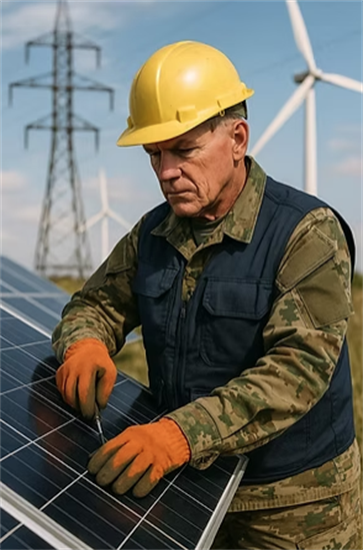Turning Valor into Voltage: Veterans and the Grid of Tomorrow
Washington, D.C. ,
July 10, 2025
Enter the Veterans Energy Transition (VET) Act, a bipartisan proposal introduced by Representatives Jen Kiggans and Chrissy Houlahan, both veterans themselves. The bill strengthens the Department of Defense’s SkillBridge program, which allows transitioning service members to intern with civilian employers during their final months of active duty.
Originally published in Security and Democracy Forum
Every year, over 200,000 U.S. service members transition out of the military. Many bring with them highly technical skills, deep discipline, and mission-focused leadership. At the same time, the United States faces a deepening shortage of skilled workers in energy, advanced manufacturing, and utility sectors. These are the very fields that underpin our economic resilience and national security. The numbers speak for themselves. Nearly 10,000 electricians leave the workforce annually, but only about 7,000 new ones enter, according to the Bureau of Labor Statistics. The energy sector is struggling to build and maintain the infrastructure needed for a modern grid, and advanced manufacturing continues to face acute talent shortages across the country. These aren’t abstract policy problems, they are operational chokepoints that could impact everything from clean energy buildout to critical infrastructure security. The question, then, is why we’re not doing more to connect these dots. Military veterans often possess the ideal mix of experience and adaptability for these roles. Many have already worked on power systems, heavy machinery, cybersecurity, or supply chain logistics in active duty settings. Yet barriers remain. Some are bureaucratic: licensing and certifications that don’t translate between military and civilian worlds. Others are structural: limited access to employers who understand how to onboard and upskill veterans. The result is a persistent underemployment problem among veterans and a labor shortage in sectors that can least afford it. Enter the Veterans Energy Transition (VET) Act, a bipartisan proposal introduced by Representatives Jen Kiggans and Chrissy Houlahan, both veterans themselves. The bill strengthens the Department of Defense’s SkillBridge program, which allows transitioning service members to intern with civilian employers during their final months of active duty. It also establishes a Department of Labor grant program to support companies hiring eligible veterans, spouses, and retirees. Employers can receive up to $10,000 per hire and $500,000 annually to cover training, certification, relocation, and onboarding costs. Legislatively, the VET Act enjoys strong bipartisan support, earning praise from groups like the Niskanen Center and industry coalitions. With both Reps. Kiggans and Houlahan on the House Armed Services Committee, and wide backing from defense and energy stakeholders, the bill is well-positioned for consideration in the FY 26 National Defense Authorization Act. Including it in the NDAA would ensure mandatory funding and formalize civilian–military transition partnerships, giving the program real legislative teeth. On its face, the VET Act is a refreshingly strategic approach. It doesn’t just support veterans for their own sake. It aligns national workforce development with energy transition and national security. It helps veterans land in good jobs while also helping America meet the demands of its rapidly evolving energy economy. But like any proposal, its success depends on execution. If it passes, and I hope it does, the program will continue to need dedicated support and be implemented at scale. The broader risk is that good legislation without meaningful follow-through becomes another underfunded good idea. Yet if implemented well, the VET Act could be a model, not just for veteran transition, but for how public policy can meet multiple strategic goals at once: climate resilience, economic competitiveness, and national security. Veterans are not a social liability. They are a human capital asset. Policies like the VET Act recognize that reality and act accordingly. That’s something both parties and the country should be able to rally around. |
In the News



